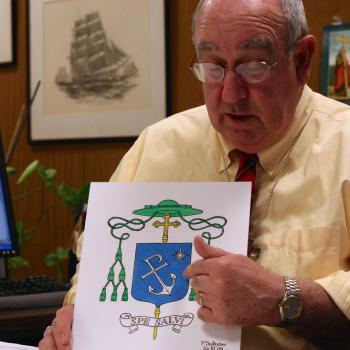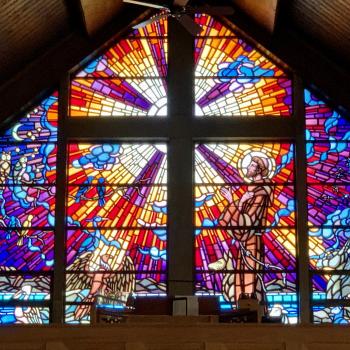A reader takes objection to this post about the lack of deacons in Lincoln, Nebraska. He writes:
I disagree with your post on the diaconate in the Diocese of Lincoln. His Excellency was smart not to bring permanent deacons into the diocese. There is very little theology behind the permanent diaconate which is agreed upon across the Church, for a number of reasons, and this has caused much strife. It is impossible to replicate exactly the ancient diaconate; also, we should not try to, as that would be archaeologism. The diaconate had clearly changed from its institution by the Apostles and 1967, when the permanent diaconate was established in modern times. A deacon’s role in the Church was always very specific, both in the liturgy and outside of it. A priest can assist as deacon or subdeacon in the Extraordinary Form. The diaconate was the second stepping-stone to the fulfillment of Holy Orders in the sacred priesthood, the first being subdeacon. The bishop traditionally wore a dalmatic under the chasuble as a reminder of this (Keep in mind, bishops only became the third step in the sacrament in the 1970s; before this, they were considered priests asked to serve their brother priests, the religious, and the laity of the local Church).
Now, priests aren’t sure what exactly to do with deacons, much of the time. The liturgy doesn’t require them,necessarily. It is obvious from a cursory glance at the rubrics that the Holy See anticipates a deacon serving at Mass, but it is not required as it was for the Solemn High Mass. On the other hand, the diaconate was suddenly made unique, and somewhat separated from the priesthood. The dalmatic under the chasuble was eliminated and priests cannot vest as a deacon at Mass in the Ordinary Form. Some dioceses see deacons as suitable for parish administration; others see them as suitable for chaplaincy at prisons and hospitals, among other tasks. Yet others simply assign them to parishes with their job left up to the pastor. The law seems to be quite silent on this, even though it’s quite specific on most other clerical assignments.
I think the issue of deacons preaching at Mass shows why the permanent diaconate was not thought out well. Bishops aren’t always clear on the faculties given, and each bishop rules differently (as is their right, but it causes confusion nonetheless). Quite honestly, the deacon should not preach at Mass. This was never a function of deacons, and is the job of priests.
Also, the division between priests and deacons is quite evident; you have blogged about deacons wearing the collar a number of times. I view this as an indicator that a number of deacons see themselves as junior-grade priests, and some see this as steps towards eliminating clerical celibacy in the Roman Church, which priests recognize and rightly oppose. Speaking of clerical celibacy, Dr Peters’ points on celibacy still haven’t been addressed. Obviously, there is no theology of deacons which would allow them to do this- taking us back to square one on the problems of the diaconate. Taking from the Eastern Churches isn’t right, because it’s not our patrimony. On the other hand, the current situation is not working. (That leaves us taking a little from the Code of Canon Law for the Eastern Churches, most likely mandating fasts from marital relations the night before Mass and during certain times of year. Also, it would apply to married priests as well.).
Your links to other dioceses and their ordinations of priests don’t prove much. Lincoln always has a consistently high number of priests being ordained for the diocese, and is ordaining a higher number of priests based on the number of faithful in the diocese, compared to other areas. A shortage is unlikely, even as a higher-than-usual number are released to serve for the Archdiocese for the Military Services.
The priesthood is what young men should aspire to if they wish to be ordained clergy, not the diaconate, for the salvation of souls can only be fully facilitated by a priest. If a man wants to get married, that’s perfectly fine and just as acceptable and necessary as the priesthood. But you can’t have both, and I notice that a number of diaconal ordinations came after the man didn’t finish seminary but always regretted it. That’s not the way vocations work (and it’s a product of the hermeneutic of rupture following the 2nd Vatican Council). If you have a calling, keep at it.
Well. Obviously, as a deacon, I disagree. And I tend to think that the Holy Spirit knows what He is doing in inspiring the Church to restore the diaconate as a full order. (I imagine there are some parishes, priests and deacons that would concur.) Among other things, I think that the writer too easily dismisses or diminishes the fundamental role of grace in all this. The diaconate is not a job; it’s a vocation. Holy Orders is not a career choice; it’s a sacrament. And yes: it is a calling. And it is one that continues to enrich countless parishes and families. Periodically, someone will ask me “Why should there be deacons when so much of what deacons do can be done by lay people?” And the answer is simple: grace. The grace of the sacrament can knock you off your feet. There are some days when I can’t even begin to imagine how I will make it through another wake, another homily, another annulment, another meeting or class or liturgy. But God’s grace provides. The sacramental grace of Holy Orders somehow helps me transcend my limitations and makes the impossible possible. I’m here to tell you: it is real. And God’s hand is behind it all.
I could go on. But I’m going to invite others to join the conversation. I’m opening up comments for this post, but they will be moderated. Be respectful, and charitable. I think this is a discussion worth having, and I hope it will shed more light on why the diaconate matters, and what it means to have a religious vocation.
UPDATE: For handy reference (and just because it’s good to read this from time to time), here’s what the catechism has to say about deacons:
1569 “At a lower level of the hierarchy are to be found deacons, who receive the imposition of hands ‘not unto the priesthood, but unto the ministry.”‘53 At an ordination to the diaconate only the bishop lays hands on the candidate, thus signifying the deacon’s special attachment to the bishop in the tasks of his “diakonia.”54
1570 Deacons share in Christ’s mission and grace in a special way.55 The sacrament of Holy Orders marks them with an imprint (“character”) which cannot be removed and which configures them to Christ, who made himself the “deacon” or servant of all.56 Among other tasks, it is the task of deacons to assist the bishop and priests in the celebration of the divine mysteries, above all the Eucharist, in the distribution of Holy Communion, in assisting at and blessing marriages, in the proclamation of the Gospel and preaching, in presiding over funerals, and in dedicating themselves to the various ministries of charity.57
1571 Since the Second Vatican Council the Latin Church has restored the diaconate “as a proper and permanent rank of the hierarchy,”58 while the Churches of the East had always maintained it. This permanent diaconate, which can be conferred on married men, constitutes an important enrichment for the Church’s mission. Indeed it is appropriate and useful that men who carry out a truly diaconal ministry in the Church, whether in its liturgical and pastoral life or whether in its social and charitable works, should “be strengthened by the imposition of hands which has come down from the apostles. They would be more closely bound to the altar and their ministry would be made more fruitful through the sacramental grace of the diaconate.”59











